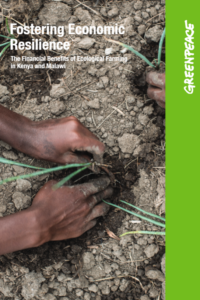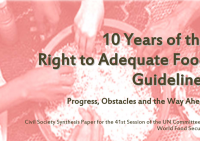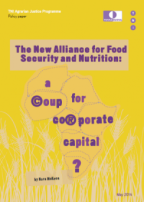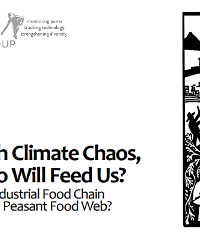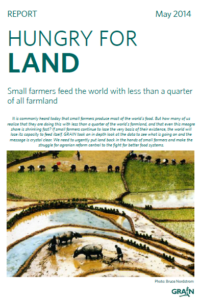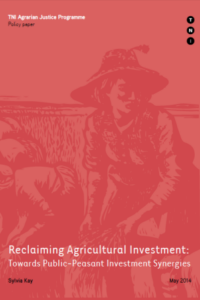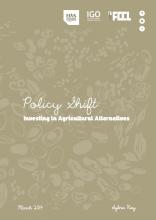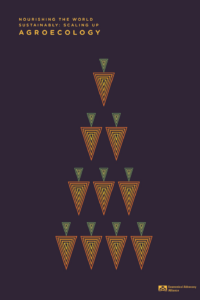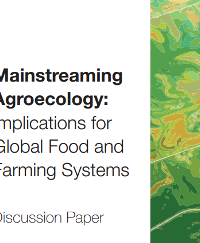The evidence in this report suggests that it is more profitable for small-scale farmers in Africa to practise ecological farming that uses no chemical pesticides or fertilisers than it is to use chemicals. Presenting the results of new fieldwork in Malawi and Kenya, this report shows that farmers practising agroforestry (involving the use of natural ‘fertiliser trees’
instead of chemical fertilisers) and ‘Push-Pull’ technology, which eliminates the need for chemical pesticides) achieve higher incomes and yields than those practising chemical-intensive agriculture.
10 Years of the Right To Adequate Food Guidelines
The paper is a product of a broad civil society consultation process, facilitated by the Global Network for the Right to Food and Nutrition.
The paper was intended to be presented at the 41st session of the Committee on World Food Security. Read more
The New Alliance for Food Security and Nutrition. A coup for corporate capital?
This report explores the ways in which global corporations are influencing development agendas in Africa, and the faulty rhetoric that underpins their vision of development. Small farmers produce 80% of the food consumed in Africa today Read more
With Climate Chaos, Who Will Feed Us? The Industrial Food Chain or the Peasant Food Web?
This short report compares the industrial food system with peasant farming. Industrial farming gets all the attention (and most of the land). Read more
Hungry for land: small farmers feed the world with less than a quarter of all farmland
It is commonly heard today that small farmers produce most of the world’s food. But how many of us realise that they are doing this with less than a quarter of the world’s farmland, and that even this meagre share is shrinking fast? Read more
Reclaiming Agricultural Investment
Towards Public-Peasant Investment Synergies
This report argues that there is a need to ‘reboot’ the debate on agricultural investment, away from the narrow corporate centric perspective, towards maximising synergies between public investments and the investments made by small- scale food producers.
Policy Shift. Investing in Agricultural Aletrnatives
Policy Shift identifies ten key policy changes that are required to support just alternative agriculture investments. The approach integrates human rights into the core of decision-making and is informed by practical, on-the-ground examples of positive agricultural investments that benefit both small-scale farmers and communities.
Regenerative Organic Agriculture and Climate Change
The white paper, Regenerative Organic Agriculture and Climate Change: A Down-to-Earth Solution to Global Warming, is issued by Rodale Institute, an independent nonprofit agricultural research institute based in the U.S.
It focuses on the regenerative organic agriculture’s role in reversing both climate issues and food insecurity. Read more
Nourishing the World Sustainably: Scaling Up Agroecology
The cases, the research and the studies to which this Report refers clearly show that in Africa, Asia and Latin America there are many Ngos and farmer-led initiatives promoting agroecological production that have demonstrated a positive impact on the livelihoods of millions of people living in small farming communities. Read more
Mainstreaming Agroecology: Implications for Global Food and Farming Systems
The Centre for Agroecology and Food Security (UK) has just released a Discussion Paper on the principles and practices of agroecology and how mainstreaming them can potentially meet the challenges facing agriculture and food production. Read more

